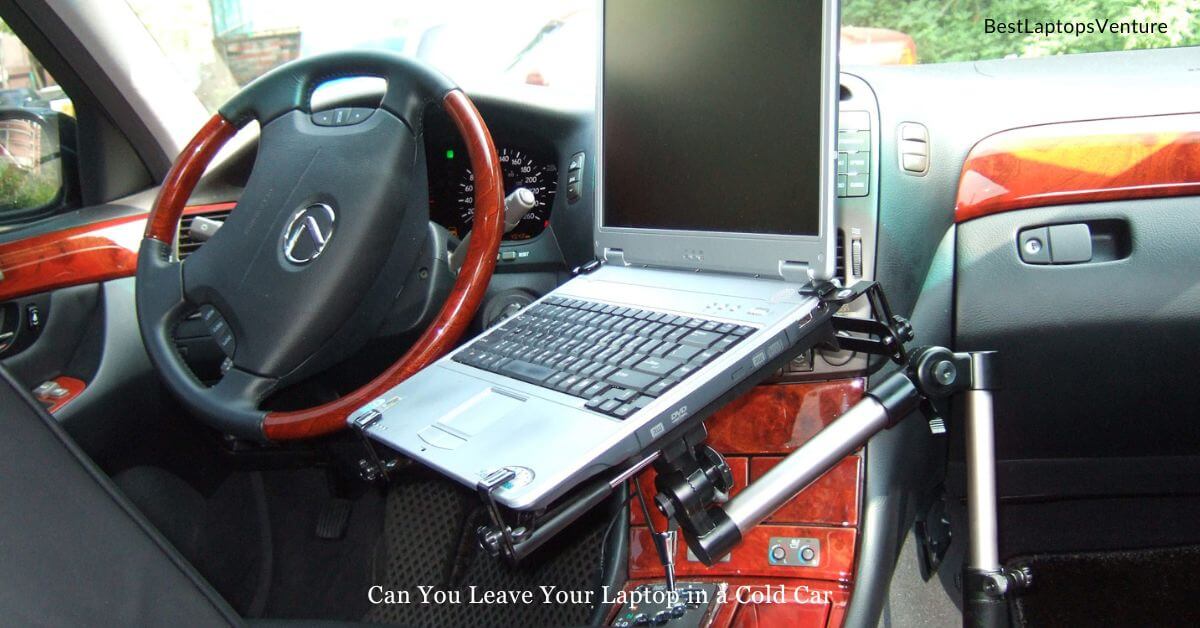
Yes, you can leave your laptop in a cold car, but it is not recommended. Leaving your laptop in a cold car can cause damage to the internal components and affect its performance.
Cold temperatures can cause condensation inside the laptop, leading to corrosion and potential short circuits. Additionally, extreme cold can also cause the battery to drain quickly.
It is best to avoid exposing your laptop to extreme temperatures and keep it in a safe and controlled environment to ensure its longevity and optimal functionality.
Understanding The Impact Of Cold Temperatures On Laptops
Leaving your laptop in a cold car can significantly impact its performance and longevity.
Cold temperatures can cause issues such as slow processing speed, reduced battery life, and potential damage to internal components.
It’s best to avoid exposing your laptop to extreme cold and ensure proper storage to maintain optimal functionality.
Importance Of Temperature Regulation For Laptop Devices
- Laptops are sensitive to temperature changes, requiring proper regulation to maintain their performance and longevity.
- Temperature control is crucial for laptops to prevent damage to internal components and ensure optimal functionality.
- Keeping the appropriate temperature range helps to avoid overheating or excessive cooling, which can lead to system failure or diminished performance.
Effects Of Cold Temperatures On Laptop Performance And Components
- Cold temperatures can negatively impact laptop performance and various internal components.
- The display may take longer to turn on, becoming sluggish or unresponsive due to temperature-related delays.
- Operating speed may decrease, affecting overall laptop performance and causing programs and applications to run slowly.
- The battery life may significantly reduce, resulting in shorter working times and the need for frequent recharging.
Common Issues Caused By Exposing Laptops To Cold Environments
- Cracked or damaged display: Sudden temperature changes in cold environments can cause the laptop’s display to contract or expand, leading to cracks or other physical damage.
- Reduced battery life: Cold temperatures can affect the chemical reactions within the battery, causing it to drain faster than usual.
- Hard drive failure: Cold temperatures can make the laptop’s hard drive more susceptible to damage, resulting in data loss or system crashes.
- Condensation: When a laptop is exposed to extreme cold and brought into a warmer environment, condensation can form on its components, potentially leading to corrosion or short circuits.
Remember, protecting your laptop from extremely cold temperatures is essential to maintain its performance and avoid potential damage.
Best Practices For Protecting Your Laptop In Cold Weather
Protecting your laptop in cold weather is crucial to prevent damage. However, leaving your laptop in a cold car is not recommended, as it can lead to condensation, extreme temperature fluctuations, and potential harm to the device’s components.
It’s best to carry your laptop with you or store it in a temperature-controlled environment.
Precautions To Take Before Leaving Your Laptop In A Cold Car:
Before you even think about leaving your precious laptop in a freezing car, taking precautions is vital to ensure its safety. Here are a few essential steps to follow:
- Providing Proper Shutdown and Storage: Before leaving your laptop, make sure you shut it down properly by closing all applications and saving any unsaved work. This will help prevent data loss and potential damage during the cold.
- Backing Up Data and Saving Work: Regularly backing up your important files and documents is always a good practice. Before leaving your laptop in a cold car, make sure to save any ongoing work and store it securely to avoid losing it in case of any unexpected incidents.
- Removing External Devices and Disconnecting Power: To prevent potential damage to your laptop or its external devices, remove any USB drives, chargers, or other peripherals before leaving it cold. Also, make sure to disconnect the power adapter.
Insulating Measures For Keeping Your Laptop Safe In Cold Conditions:
Just like you would bundle up in cold weather, your laptop needs some insulation, too.
Here are a few measures you can take to keep your laptop safe in cold conditions:
- Using Laptop Sleeves or Cases: Investing in a well-insulated laptop sleeve or case can provide extra protection against the cold. Look for products specifically designed to provide thermal insulation.
- Wrapping Laptop in Insulating Materials: If you don’t have a laptop sleeve, you can wrap your laptop in soft materials like a thick scarf or a towel to protect it from the cold. This can help retain some of the heat generated by the laptop itself.
- Utilizing Portable Heating Solutions: Portable heating solutions can warm your laptop in extremely cold conditions. Remember not to place the laptop directly before the heat source to avoid overheating.
Tips For Thawing A Frozen Laptop Safely And Effectively:
If you do end up with a frozen laptop, don’t panic! Here are some tips to thaw it safely and effectively:
- Gradually Warming Up the Laptop: Start by allowing the laptop to warm up gradually at room temperature. Avoid using external heat sources like hairdryers, as rapid temperature changes can cause condensation and potential damage to internal components.
- Using Condensation Prevention Techniques: To prevent condensation from forming when the laptop warms up, place it in a sealed bag or container with a packet of silica gel or a desiccant. This will help absorb any moisture in the air and minimize the risk of damage.
- Seeking Professional Assistance if Needed: If your laptop doesn’t thaw out or show signs of functioning properly after following the above steps, it’s advisable to seek help from a professional technician. Trying to fix it yourself may cause further damage.
Additional Considerations For Extreme Cold Environments

Additional considerations must be considered when leaving your laptop in a cold car during extreme cold environments.
Extreme cold temperatures can negatively affect your laptop’s performance and battery life, potentially causing damage if not adequately protected.
It is advisable to avoid leaving your laptop in a cold car for extended periods to maintain optimal functionality.
Extreme Cold: When to Avoid Leaving Your Laptop in the Car
In extremely cold environments, it’s crucial to consider the potential consequences of leaving your laptop in a cold car.
While laptops are designed to withstand various conditions, prolonged exposure to extremely low temperatures can adversely affect their performance and longevity.
Here are some crucial points to keep in mind:
- Extreme cold temperatures can significantly impact the functionality of your laptop. Freezing temperatures can cause the internal components and circuitry to contract, potentially leading to damage or malfunction.
- Cold temperatures can also affect the battery life and performance of your laptop. When exposed to extreme cold, the battery can drain faster than usual, reducing operating time.
- Another concern with leaving your laptop in a cold car is the potential damage to internal components and circuitry. The cold environment can cause condensation when bringing your laptop back to a warmer area. This condensation can harm sensitive electronic parts and lead to corrosion or short circuits.
Alternatives To Leaving Your Laptop In A Cold Car
Considering the risks associated with extremely cold temperatures, it’s wise to explore alternative options for storing your laptop:
- Taking your laptop inside with you is a straightforward solution. Instead of leaving it in the cold car, bring it indoors in more suitable conditions. This way, you can ensure your laptop remains functional and protected.
- Utilizing storage lockers or secure facilities can be a viable option if you cannot bring your laptop inside with you. These facilities typically provide controlled environments, protecting your laptop from extreme cold and other potential risks.
Long-Term Effects Of Frequent Exposure To Cold Temperatures
Frequent exposure to cold temperatures can affect your laptop’s performance and lifespan.
It’s essential to be aware of these implications:
- Your laptop’s battery life and overall performance may be compromised over time if it frequently endures cold environments. The repeated contraction and expansion of internal components due to temperature changes can eventually lead to hardware failures or decreased efficiency.
- Frequent exposure to extreme cold can also shorten the lifespan of your laptop. The stress caused by temperature fluctuations can accelerate wear and tear, potentially resulting in the need for repairs or a replacement sooner than expected.
Extreme cold temperatures pose risks to the functionality and longevity of your laptop. It’s advisable to avoid leaving your laptop in a cold car when possible.
Instead, consider alternative options such as taking it inside with you or storing it in a controlled environment.
Taking these precautions, you can mitigate potential damage and ensure your laptop remains in optimal condition for extended periods.
Frequently Asked Questions Of Can You Leave Your Laptop In A Cold Car
How Cold Is Too Cold For A Laptop In A Car?
Laptops in cars should not be exposed to temperatures below -20 degrees Celsius to avoid damage.
Is It Safe To Leave Laptop In Cold Car?
Leaving a laptop in a cold car is not safe as it can cause damage to the device.
Is It OK to Leave Laptop In Car?
It is not advisable to leave your laptop in a car due to potential risks of theft, damage from extreme temperatures, and exposure to direct sunlight.
How Cold Is Too Cold For Electronics?
Extreme cold temperatures can harm electronics, but anything below -40 degrees Fahrenheit is generally considered too cold.
Can Leave Your Laptop In A Cold Car Damage It?
Leaving your laptop in a cold car can damage it due to extreme temperature fluctuations, causing battery issues and potential internal component damage.
How Cold Can A Laptop Withstand?
Laptops can typically withstand temperatures ranging from 50°F to 95°F (10°C to 35°C). However, extremely cold temperatures below freezing can harm the device.
Can Low Temperatures Affect Laptop Performance?
Low temperatures can negatively impact laptop performance by slowing down the processor and reducing battery life. It is best to avoid exposing your laptop to extremely cold temperatures.
How Long Can You Safely Leave A Laptop In A Cold Car?
Leaving a laptop in a cold car for an extended period is not recommended. Ideally, limit exposure to a few minutes to prevent potential damage.
Can Condensation Occur When Bringing A Cold Laptop Indoors?
Yes, bringing a cold laptop indoors can lead to condensation formation, which can damage internal components. Allow the laptop to adjust to room temperature before usage.
Should I Allow My Laptop To Warm Up Before Using It After Being In The Cold?
Yes, allowing your laptop to warm up to room temperature is advisable before using it. This helps prevent potential damage caused by temperature variations.
Conclusion on Can You Leave Your Laptop In A Cold Car
Maintaining the optimal temperature for your laptop is crucial to its overall performance and longevity.
Leaving your laptop in a cold car can expose it to potential damage, especially if the temperature drops below freezing.
Extreme cold can cause the delicate internal components of your laptop to contract, increasing the risk of permanent damage.
Additionally, condensation can form when the laptop is exposed to rapid temperature changes, leading to moisture inside the device and potential corrosion.
To ensure the safety of your laptop, it is advisable to avoid leaving it in a cold car for extended periods.
Instead, bring it with you whenever possible or store it in a temperature-controlled environment.
By taking these precautionary measures, you can protect your valuable device and enjoy its optimal performance for years.
Read also: Can A Laptop Get Too Cold



![9 Best Laptops For Film Students and Video Editing in May 2025 [Expert Recommended] 7 Best Laptops for Film Students and Video Editing](https://bestlaptopsventure.com/wp-content/uploads/2024/02/best-laptops-for-film-students-and-video-editing-1.jpg)
![9 Best Laptops For Pharmacy Students in May 2025 [Expert Recommended] 8 Best Laptop For Pharmacy Students](https://bestlaptopsventure.com/wp-content/uploads/2024/04/best-laptop-for-pharmacy-students.jpg)
![How To Convert Work Laptop To Personal? [22 Personal Steps] 9 How To Convert Work Laptop To Personal](https://bestlaptopsventure.com/wp-content/uploads/2024/03/how-to-convert-work-laptop-personal.jpg)
![9 Best Tablets For Cricut Design Space in May 2025 [Expert Recommended] 10 Best Tablets For Cricut Design Space](https://bestlaptopsventure.com/wp-content/uploads/2024/02/Best-tablets-for-cricut-design-space.jpg)
![9 Best Laptops for Revit May 2025 [Expert Recommended] 11 Best Laptops for Revit](https://bestlaptopsventure.com/wp-content/uploads/2024/03/best-laptops-for-revit.jpg)
![How to Measure Laptop Screen Size? [Easy Guide] 12 How to Measure Laptop Screen Size](https://bestlaptopsventure.com/wp-content/uploads/2024/02/how-to-measure-laptop-screen-size.jpg)

![9 Best Laptops for Pentesting in May 2025 [Expert Recommended] 14 Best Laptops for Pentesting](https://bestlaptopsventure.com/wp-content/uploads/2024/02/best-laptops-for-pentesting-1.jpg)